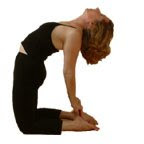Let's take a look at Janu Sirsasana A, head to knee pose, to open our hips and see how it also opens our back, legs and ankles. First, let's look at a picture of the pose.

Now let's give it a try so you can feel the opening in your own body. Begin by sitting on your mat.
- Park the heel of the right foot securely in your groin. The sole of your right foot is positioned into the inner left thigh. You thighbones are creating a 90-degree angle. The left leg is straight. Toes pointing upward.
- Inhale your arms up towards the sky.
- Exhale forward bend clasping both hands to the left foot. Bring the right ribs forward feeling a gentle twist through the waist as to lengthen both sides of the spine equally.
- Inhale look up with straight arms and straight spine.
- Exhale full forward bend, extending your spine out over your left leg. Bring your right ribs forward and keep your shoulders away from ears. Hold for 5 Ujjayi breaths. As you are here, feel the stretch in the right hip and the stretch in the hamstring. You may also be able to feel a stretch in your calf, ankle and the bottom of your foot. Breath into the areas where you are feeling the stretch.
- Inhale look up and switch sides. Notice the differences between one side and the other.
As in all forward bending positions, we want to avoid rounding out the spine. So the focus is chest to knee and not head to knee. We also want to bring awareness into the right hip. Creating opposing forces of energy, we ground out through the right hip as we pull forward and down through the right ribs. This alignment would be contraindicated for people with sacroiliac problems. In this case, instead of creating opposing forces of energy between the hip and the ribs, allow your hip to travel energetically in the same direction as the ribs. This will minimize the torque which can aggravate the sacroiliac area.
Now, let's try a squat, Malasana. When I was doing my teacher training, we did Malasana for 3-11 minutes. I can tell you that extended squatting really opens the hips and low back. First a picture of Malasana.

- Stand in Samasthiti in the center of your mat and face the long edge of the mat.
- Step your feet to a wider stance, more than hip-width, with your toes out.
- Inhale your arms over your head keeping your gaze forward.
- Exhale full forward bend taking your hands to the floor in front of you.
- Take an inhale while you are in your forward bend.
- Exhale begin to squat by lowering your pelvis toward the floor to a comfortable but strong position. Keep your knees in the same direction as your toes.
- Inhale your hands into Namaste (prayer position). Feel yourself lengthening your spine out of your pelvis to the top of your head as if someone has a string on the top of your head pulling you toward the ceiling. You should feel a nice stretch in your inner thighs/groin area. Hold this pose for few breaths up to several minutes. You decide!
Squatting opens your pelvic area and hips. It also can help relieve lower back discomfort and stiffness. You can also try this pose with the wall and with a block so that you can relax into the pose. It is a more passive variation than a freestanding pose.

As you do your regular practice, take the opportunity as you a breathing into your pose to really feel not just the obvious areas where you are opening your body, but the more subtle areas too.
Namaste,
Leslie Ottavi




